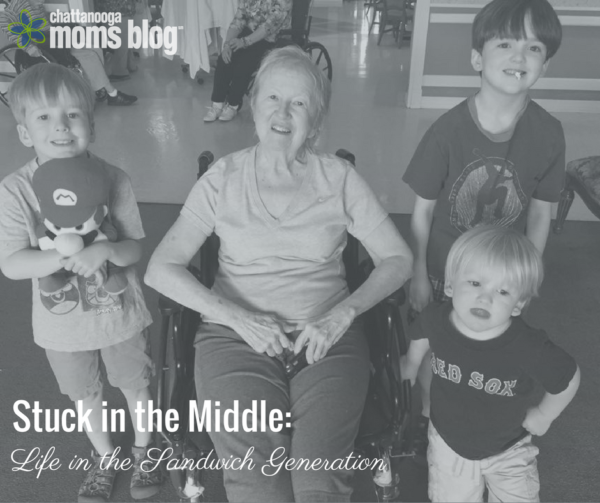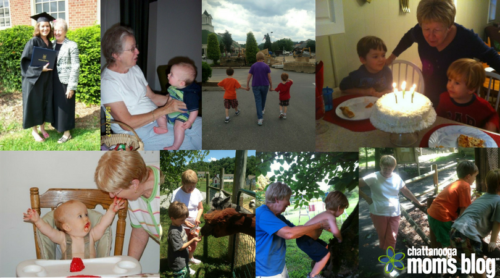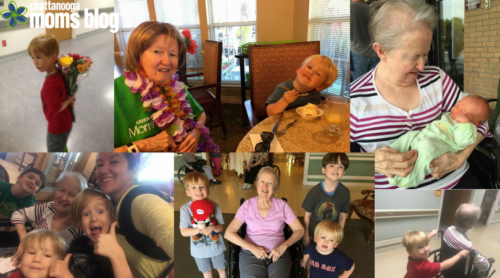
It’s 9pm on a Saturday night and I am sitting in a hotel in my hometown, drinking wine from a plastic cup, with my youngest, age two, laying beside me.
This morning I got up at 6am, cooked breakfast, did a load of laundry, showered, taught a couple classes at the Y, bought groceries, put those groceries away — a typical Saturday for a mama. Except then I loaded up, leaving my oldest three (ages 10, 9, and 5) behind, so I could go spend a few hours with my mom in a nursing home.
Welcome to life in the sandwich generation.
The sandwich generation is defined as a “generation of people, usually in their 30s or 40s, who are both caring for aging parents and supporting children.” This sandwich generation is a relatively new phenomenon, brought about by either our parents, who decided to wait until later in life to have us, or due to our own decision to wait until we were older to marry and have children. I was placed in this generation by my parents who, both married before, had me at ages 36 (my dad) and 40 (my mom).
It was innocent enough growing up. We got irritated by all the people who assumed my parents were my grandparents, but they kept up and stayed young and I essentially saw no difference between my childhood and those of my peers.
The day after I graduated high school, though, my dad passed away.
He’d been sick for several years, but my parents both made me aware of and downplayed this fact. I lost my marbles, but still felt like one of those kids who tragically and unexpectedly lost a parent at a young age. You grieve. Then you heal.
My mom was then diagnosed with Parkinson’s Disease in 1999. I was a sophomore in college. She was 59.
For many years the Parkinson’s was nothing more than a hassle. At this time, Michael J. Fox had just revealed his diagnosis and all we knew was that the disease made your hands shake. My mom continued to work full-time while I went to school. She was my mama. My rock. The pain-in-my-neck when I wanted to just drink and spend the night with my boyfriend and be a normal college student. She was there for my wedding and for the birth of my three oldest boys. She babysat and took us out for pizza. She brought doughnuts for breakfast and pushed the cart through Sam’s Club and laughed as my baby found out he could scream as mama was shopping. She told stories about how I would scream and irritate our neighbors when I was a baby. She changed her grandbabies’ diapers and held my hand through postpartum depression she didn’t understand.

Then, in July of 2013, everything changed. I went from a mom of three, to a mom of three with a parent in need of care.
My mom had a massive stroke when my youngest at the time was just over a year old. My mom was 73. Strokes, cancer, heart attacks, and other things tend to happen more frequently after a certain age. I am not blaming my mom for having me a later age (I’ve struggled through this several times during my life and I swear, I AM COOL), but it’s something we need to be aware of as, let’s be honest, life in the sandwich generation is a new kind of tough.
Think about all the things you’ve done today as a mama. There are a literal kajillion things you’ve done to care for your kids and your husband and your house and ALL OF THE THINGS. Now, imagine you have to do all of those things while caring for your mom and/or dad who now are the adult, super bossy equivalent of your sassiest toddler. Except you can’t just tell them what to do because that is definitely not your kid.
Do you feel like the baloney sandwiched between a couple of slices of wonderbread now?

Caring for your parents is tough, no matter when you face it. Those people whom you expected to be your rock forever will one day need you to step up and be the rock for them. Maybe you will be through the roughest, most sleep-deprived part of this parenting gig, or maybe you won’t. Either way, I’ve got some tips to help.
-
Talk finances.
Now. I know it’s the tough talk. All us sorority girls learned to “never talk money, religion, or politics.” I am telling you to have that tough talk with your parents RIGHT FREAKING NOW. My mom was amazing with money. We used to joke that she would spend a month deciding whether to buy a $20 wallet. She had a 401k and an IRA and a retirement fund and a secret savings. There came a point when my sister and I had to take all that over. My mom was no longer able to take care of herself or her money, so we had to step in and step up. We had to know all the details. Thankfully my mom had gone through this with her parents and had the presence of mind to add my and my sister’s names to her accounts after my dad passed. This made things significantly easier when we began having to pay bills and buy medications without my mom present.
-
Make certain your parents (and quite frankly, you too!) have a will and living will.
We all know that deciding who gets what after someone dies is a good idea, but a living will is likely even more important. No one wants to think about dying or being in some sort of vegetative state, but one or both is going to happen to every one of us sooner or later. You need to have your parents decide now what they want if they are on life support, because trust me, you do not want to be the one to decide whether or not to let your parent die. Do they want to be able to refuse food? Do they want to be resuscitated? Do they want you to pull out all the stops or let them die with dignity? Have them tell you now what they want, put it in writing, and get yourself ok with the decision. CMB contributor Brenda went into a little more detail about these issues in her post “The Business of Adulting: Five Things You Really Should Do Once You Have Children,” so be sure to check that out!
-
Take a look at your home.
Is it even minimally handicap accessible? Our first home was a split-foyer, so when my mom had her stroke we realized that she would literally never be able to visit us, much less move in if needed. Within five months we sold that house and purchased a new home with a bedroom and bathroom on the ground level. You may never have to move your parents in with you, but you will certainly want them to be able to come over for visits. A home with stairs at every entrance, no bathroom access on the main level, and all the bedrooms upstairs will keep those with mobility issues from being able to visit. That’s a terrible situation if it’s your parents who can’t come over!
-
Banish the guilt.
I’m still working on this one. I absolutely cannot stand the fact that my mom is in a nursing home. Add to that the fact that I live three hours away and my sister is having to shoulder nearly all the load of caring for my mom and I frequently feel like a dirty trash can full of poop (to quote the baby penguin in “Surf’s Up”). My sister is great about it and absolutely understands that I have to be here with my husband and children and I do my part by listening to her vent when needed. Despite the fact that I HATE talking on the phone, I answer when she calls if at all possible because I know she is carrying a heavy load and talking about it helps her out. The fact is that we are in uncharted territory. We are the first generation to be sandwiched between children who need us and parents who need us, and this tug-of-war is something we are figuring out as we go. How do we balance the needs of our children and the needs of our ailing parents? I honestly don’t know. Feeling guilty and feeling like you’re never doing enough doesn’t help anyone, though, so just know that when the time comes, you will do your best. And that is enough.
-
Finally, find support.
Absolutely nothing can prepare you for how emotionally difficult it is to take care of your parents — no matter how old you are or what stage of life you are in. Even as an adult I relied on my mama. She was there for me when I was having babies, when I had questions about raising those babies, and when I just needed a shoulder to cry on. When I was suddenly the one who had to take care of her, one of my first and frequent thoughts was “but who is going to take care of ME?” Make sure you have a safety net. Whether it’s your best girlfriends, your church, a sweet aunt, or your mother-in-law, find someone or a few someones to be there for you. I spent many nights on my mother-in-law’s couch crying and fuming and asking “why.” I will be forever grateful that she was there to be my stand-in mama. Find support where you can and do it now. Build the relationships you will need in the future to help you deal with a new and difficult normal.






















Great advice from a great Mom and daughter! As a Realtor, I especially agree with #3 and encourage everyone to think that way. You never know if it will be a parent or you (my friend’s husband slept in the den chair for 3 weeks because of a bad bike accident and he couldn’t climb stairs to his bedroom). Good stuff!
Comments are closed.